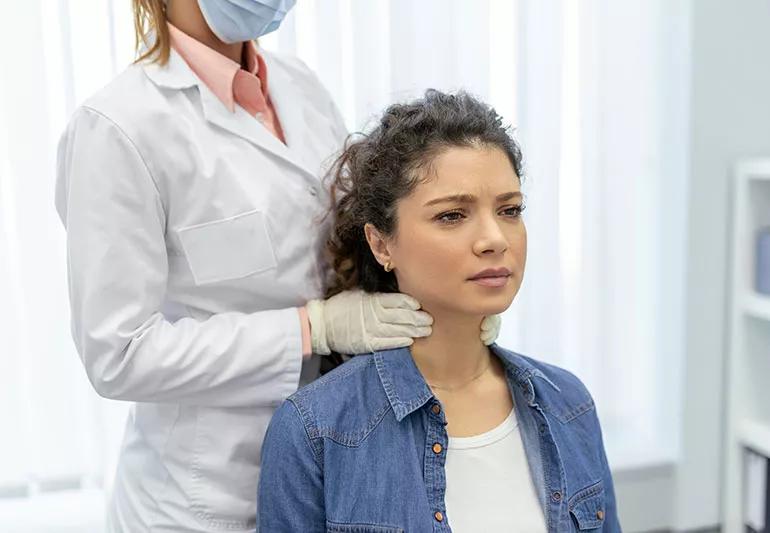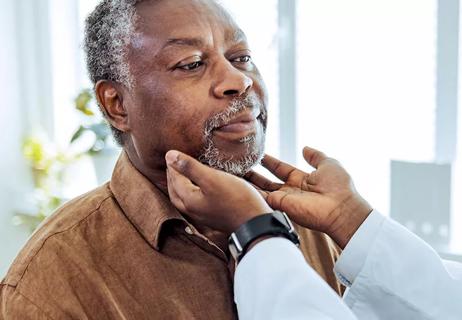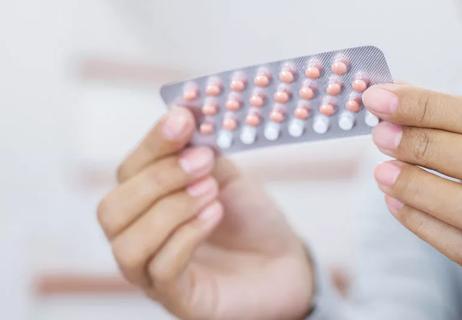Seven symptoms you should ask your doctor about

It’s probably not an exaggeration to say that every woman on the planet has, at one point or another, heard someone say, “Oh, it’s probably just your hormones.” People seem to be inclined to blame just about everything — from headaches to hot flashes and all kinds of conditions in between — on good old hormones.
Advertisement
Cleveland Clinic is a non-profit academic medical center. Advertising on our site helps support our mission. We do not endorse non-Cleveland Clinic products or services. Policy
Sometimes it is your hormones, though. And hormonal imbalances can mean more for your health than just a grumpy day or a few zits before your period. So, how can you tell when it’s hormones and when it’s something else?
Women’s health specialist Pelin Batur, MD, talks about a few types of hormonal imbalances commonly seen in women, including symptoms you shouldn’t ignore and when to see a medical professional.
To decide whether you need hormone testing (and if so, what kind), your doctor will likely start by asking you lots of questions about your symptoms. This will help them put together the puzzle pieces of what might be going on.
“The workflow in my head focuses on three questions,” Dr. Batur says. “First, do these symptoms sound hormonal? If so, do they sound like they’re related to estrogen, progesterone, testosterone or some other type of hormone? And finally, is it because they’re too low or too high?”
Once your doctor has a sense of what might be happening, they’ll figure out which tests to (or not to) run.
One symptom that indicates that you may need testing is irregular periods.
“If you’re having regular menstrual cycles and not having symptoms throughout the month, I don’t usually start with lots of estrogen, progesterone or testosterone tests,” Dr. Batur says. “But if you’re experiencing a lot of irregularities in your cycle, I’m likely to do more testing.”
Advertisement
“We have at least 50 different hormones in our body, and very complex symptoms can arise from them,” Dr. Batur says. Having too much or too little of certain hormones causes symptoms and issues with your health.
Here are some of the most common hormonal imbalances seen in people assigned female at birth (AFAB).
There are less-common hormonal imbalances, too, like Cushing’s syndrome and Addison’s disease. Only a doctor can help identify which hormonal imbalance you’re experiencing and what course of treatment is best.
Here’s the thing: Hormonal imbalances can have a lot of symptoms — and they can have a lot of different symptoms, depending on which ones are at the root of your issues. Those symptoms may seem muddled or initially unrelated, and they’re not always related to hormones at all.
“Hormones can cause so many symptoms, but that doesn’t mean they’re always the cause of your symptoms,” Dr. Batur says, “so it’s really important to be seen by a doctor for an individualized assessment.”
Here are some common symptoms of hormonal imbalances in women and what they might signify.
Weird periods are a key sign of a hormonal imbalance. Irregular menstruation can be a sign of perimenopause but can have a number of other causes, too, especially if you’re not yet nearing menopausal age.
“If your menstrual cycles are disrupted or if you’re going through menopause, you should definitely come in to be seen and to talk things out,” Dr. Batur advises.
“If a woman comes in complaining of acne, I’m concerned about potentially high levels of hormones such as testosterone,” Dr. Batur says. “We see this in women with polycystic ovary syndrome.”
Advertisement
PCOS causes higher levels of male hormones called androgens (including testosterone), which can lead to acne. And thyroid imbalances can cause acne, too.
If you start to notice differences in your hair — whether on your head, face or someplace else, like your arms and legs — it could be a sign of a hormone imbalance.
Starting to see chin hairs or a bit of a mustache? Increased testosterone can cause excess hair growth (hirsutism). This can be a symptom of PCOS or menopause, but it has other causes, too.
On the flip side, hormonal imbalances can also cause thinning hair on your head, legs and pubic region. During menopause, a drop in estrogen can lead to slower hair growth, or cause it to fall out more easily. Hypothyroidism and hyperthyroidism can cause hair loss, too. Or your hair loss may be related to something else entirely — something nonhormonal.
“It can be really complex to figure out,” Dr. Batur says. “You might assume hair loss is hormonal, but it can be related to high or low thyroid level, low estrogen, high testosterone or something else, like vitamin deficiency or lifestyle stressors.”
“These symptoms usually indicate that a woman’s hormones are lower, like the kind of dropping estrogen levels we see in perimenopause or postmenopause,” Dr. Batur says. They can also be a side effect of some medications and treatments.
Your doctor can help you find ways to manage your hot flashes so they don’t negatively affect your quality of life.
Advertisement
Weight gain can be a symptom of a variety of hormonal imbalances, as well as lifestyle-related factors, so doctors use other clues about your health to get a sense of what’s going on.
“Difficulty losing weight is a very common problem in the United States, and it’s often blamed on hormones,” Dr. Batur says. “Sometimes, it’s related to high testosterone levels, like with PCOS, and menopause is associated with weight gain, too. But if you have weight gain with regular menstrual cycles, it’s more likely to be related to something like cortisol, thyroid, insulin or lifestyle habits.”
Haven’t changed your lifestyle habits but have suddenly dropped 15 lbs.? This symptom is often a sign of an overactive thyroid, or hyperthyroidism. When your body produces too much thyroid hormone, your metabolism speeds up, which can cause weight loss along with rapid heartbeat, an intolerance to heat and other symptoms.
Although vaginal dryness can be a sign of a few issues, it’s one of the most common symptoms of menopause. Your estrogen levels drop during menopause, which can to lead vaginal dryness that causes discomfort during sex.
“The vagina is quite sensitive to lack of estrogen,” Dr. Batur says. “About 50% of women have vaginal dryness that may get in the way of intercourse, and it tends to get worse over time.”
Advertisement
While it’s important to advocate for your health, try not to be swayed by broad, overarching claims (looking at you, social media) that insist that everyone needs hormone testing or that every symptom you’re experiencing is related to your hormones.
Just because you’re experiencing symptoms of a hormonal imbalance doesn’t mean you have a hormonal imbalance. Nearly every symptom of a hormonal imbalance can have other causes, as well.
“It’s important to not lump everything together under hormones, and to instead break down each symptom individually,” Dr. Batur advises. “We have to take a deep dive to make sure we’re not missing anything, whether it’s lifestyle factors or another medical condition.”
Learn more about our editorial process.
Advertisement

Estrogen and progesterone changes throughout the month — and throughout your life — can make you more prone to dental health concerns

Plus, how to tell if you have a hormonal imbalance and what to do about it

Get familiar with these everyday toxins

Hormone changes can definitely leave you tossing and turning at night, but help is available

Developmental changes like puberty and menopause can impact symptom severity

Pass the (iodized) salt to support your thyroid, disinfect a wound and more

Get the answers from a vascular medicine specialist

Type 2 diabetes isn’t inevitable with these dietary changes

Applying a hot or cold compress can help with pain